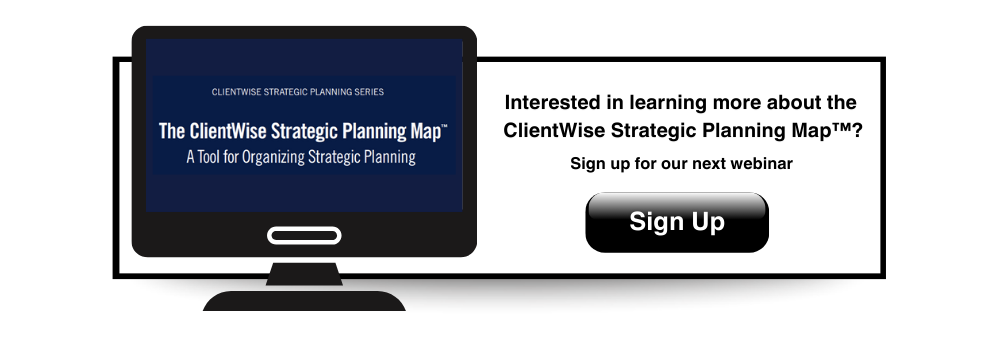8 Benefits of a Five-Year Strategic Plan for Your Business
Recently, I was talking with one of our elite advisor clients (the CEO of a $2.4 billion firm), and he shared the notion that for all its critical importance, ‘strategic planning is essentially a math equation.’ When I asked him to elaborate, he explained that:
Using Appropriate Benchmarks + Making Accurate Assumptions =
A Realistic 5-Year Pro Forma Financial Model
By calculating the forecasting in his strategic plan accurately and correctly, he can achieve far greater confidence and clarity, knowing precisely when and how to make important decisions with his leadership team.
You know, it’s one of the great ironies of our industry. While planning (the truly noble work of helping clients achieve financial success and confidence) is centered at the heart of our business, most advisors still function as ‘accidental owners’ who haven’t effectively planned for their own business’ future. And whether or not that’s the case with your own firm, it’s my experience that most advisors are overdue to update their strategic plan.
Sustained success in the wealth advisory business can only result from careful planning, dedication, and a clear vision for the future. Creating a five-year strategic plan serves as one of the most powerful tools for achieving your goals. After coaching thousands of advisors, the following are just some of the many benefits derived from a thoughtful and up-to-date five-year strategic plan:
- Clarity of Vision
Your plan allows you to define your long-term vision and set clear objectives for the enterprise—providing greater clarity around understanding where the business is headed and what steps are necessary to get there. A well-defined vision is essential for attracting and retaining clients and talent. When clients, prospects, employees, and recruits see that the owners of your firm have a clear plan for the future, they’re more likely to trust in your expertise and subsequently commit to a long-term relationship. - Goal Setting & Accountability
By setting specific key results, achievable goals, and long-term objectives, your plan empowers you and your team members to break down the long-term vision into actionable short-term goals that serve as milestones—helping everyone track their individual progress more accurately.
Additionally, your strategic plan creates a sense of accountability. When goals are clearly defined, assessing whether they have been met becomes easier. Owners and team members can regularly review progress and make necessary adjustments to remain on track toward achieving key objectives. - Performative Opportunity
Richard Branson once said, “You don’t learn to walk by following rules. You learn by doing, and by falling over.” If you’re genuinely committed to your clients and to building an enduring firm, then you must start developing next-generation strategic thinkers and planners. The strategic planning process is an ideal performative opportunity to get future firm leaders involved in planning, execution, and adjustments. It's the only way they’ll truly learn to plan for the firm’s future. To paraphrase Jack Welch, before you become a leader, success is all about growing yourself; once you become a leader, however, it’s all about growing others.
By identifying areas where next-generation leaders need to develop or acquire new skills, you empower them to invest in their own growth, ultimately benefiting the firm’s clients. And by engaging them in creating and implementing the firm’s strategic plan, you further cultivate their problem-solving and decision-making abilities. - Risk Mitigation
Our industry isn’t immune to economic fluctuations and market volatility. A well-structured strategic plan outlines strategies for mitigating potential risks—allowing you to more effectively protect your client's investments and financial well-being by identifying potential challenges and having contingency plans in place. A plan also helps to diversify your offerings and revenue streams better to buffer against unexpected downturns in specific sectors or markets. - Improved Time Management
Time is an advisor’s most precious commodity. Effective time management is, therefore, crucial. And a five-year strategic plan will help you allocate your time and resources more efficiently—avoiding distractions and unproductive tasks by focusing on activities that align with long-term goals.
It also helps you to prioritize clients and prospects by identifying high-value clients and allocating more time and attention to nurturing those relationships; ultimately increasing both client satisfaction and loyalty. - Enhanced Client Communication
Clients expect and value transparency and proactive communication from you. Your five-year plan serves as a valuable client engagement tool—allowing you to share the firm’s vision and long-term goals so clients feel like active participants in the journey.
Regular updates on the progress of the strategic plan also help to strengthen client relationships and build trust. And by showing your commitment to achieving specific objectives, you’ll likely foster greater loyalty and drive more referrals. - Competitive Advantage
A well-thought-out strategic plan helps set you apart from competitors and demonstrates a commitment to professionalism and sustained success. Potential clients are more likely to choose an advisor who can articulate a long-term strategy and demonstrate a clear path to achieving financial goals. Your plan can be a powerful marketing tool to attract new clients and differentiate your business in a crowded marketplace. - Personal and Professional Growth
Creating a five-year strategic plan isn’t just about the business; it also presents an opportunity for personal and professional growth—using the planning process to reflect on your skills, strengths, and areas for improvement and those of your future leaders.
Leaders who invest time and effort into creating a five-year strategic plan for long-term success are far better poised to navigate the challenges of this volatile industry and deliver an exceptional service experience to their clients. It's a valuable investment in the future that pays dividends in both business success and personal development.
So, if your aim is to build an enduring wealth advising business, now’s the time to start planning your five-year strategic journey! And I encourage you to share these insights with your entire team—especially your next-generation leaders.
Coaching Questions from this Blog
- What are your long-term business objectives and key growth/financial targets?
- How do you develop your next-generation leaders as strategic thinkers and decision-makers?
- How do those goals translate into a strategic plan with actionable objectives and key results?
- What actions can you take as a leader to more effectively model being committed to and acting within the scope of your firm’s shared vision and values?
- What issues must you address now (e.g., building capacity, upgrading technology, etc.) to better position the business to meet your five-year goals?
Like this blog? Click "Follow" in the upper right-hand corner to receive all the eLibrary Blog updates!



